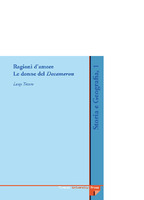Ragioni d'amore
| dc.contributor.author | Luigi, Totaro | |
| dc.date.accessioned | 2010-10-04 00:00:00 | |
| dc.date.accessioned | 2020-04-01T15:24:37Z | |
| dc.date.available | 2020-04-01T15:24:37Z | |
| dc.date.issued | 2005 | |
| dc.identifier | 356394 | |
| dc.identifier | OCN: 808384767 | en_US |
| dc.identifier.uri | http://library.oapen.org/handle/20.500.12657/34731 | |
| dc.description.abstract | This text proposes a rereading of the Decameron that traces the female figures - 'constrained' as we are told in the Proem, by the 'wishes', 'desires' and 'orders' of fathers, mothers, brothers and husbands - in their attempt to open up areas of personal life. The possession of the female body, considered as part of the family property in a social context governed by a commercial rationale, is an instrument of the violence characterising all social relations, which Boccaccio indicates as a cause for the wrath of God that exploded in the plague of 1348. Moreover, their bodies also become an instrument in the hands of the women themselves when they decide - with all the ambiguity which the context imposed (even on the author) - to repossess the same to use it as a weapon of revenge, an occasion of joy or a gift of love. | |
| dc.language | Italian | |
| dc.subject.classification | thema EDItEUR::D Biography, Literature and Literary studies::DS Literature: history and criticism::DSR Literary reference works | en_US |
| dc.subject.classification | thema EDItEUR::J Society and Social Sciences::JB Society and culture: general::JBF Social and ethical issues | en_US |
| dc.subject.other | italian literary | |
| dc.subject.other | donne | |
| dc.subject.other | letteratura italiana | |
| dc.subject.other | women | |
| dc.subject.other | giovanni boccaccio | |
| dc.subject.other | decameron | |
| dc.title | Ragioni d'amore | |
| dc.type | book | |
| oapen.abstract.otherlanguage | Il testo propone una rilettura del Decameron seguendo le figure femminili "costrette", come dice il Proemio, "da' voleri, da' piaceri, da' comandamenti de' padri, delle madri, de' fratelli e de' mariti" nei loro tentativi di aprire spazi di vita propria. Il possesso del corpo delle donne, parte del patrimonio familiare nel contesto sociale guidato dalla ragion di mercatura, è uno strumento della violenza che connota tutti i rapporti sociali, e che il Boccaccio indica come causa dell'ira di Dio esplosa nella peste del 1348. Ma diviene anche strumento delle donne quando decidono con tutta l'ambiguità che il contesto imponeva (anche all'Autore) di riappropriarsene per farne arma di vendetta, occasione di gioia, o dono d'amore. | |
| oapen.identifier.doi | 10.26530/OAPEN_356394 | |
| oapen.relation.isPublishedBy | bf65d21a-78e5-4ba2-983a-dbfa90962870 | |
| oapen.relation.isbn | 8884532531 | |
| oapen.identifier.ocn | 808384767 |

